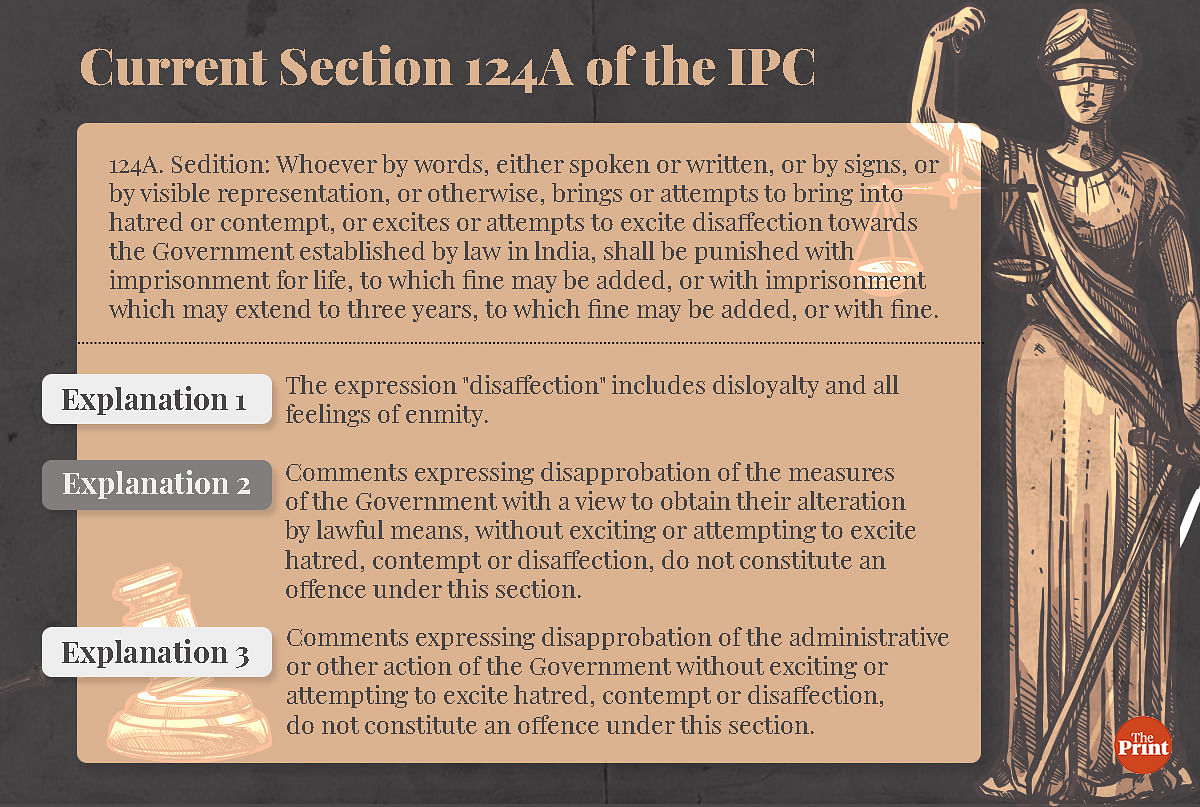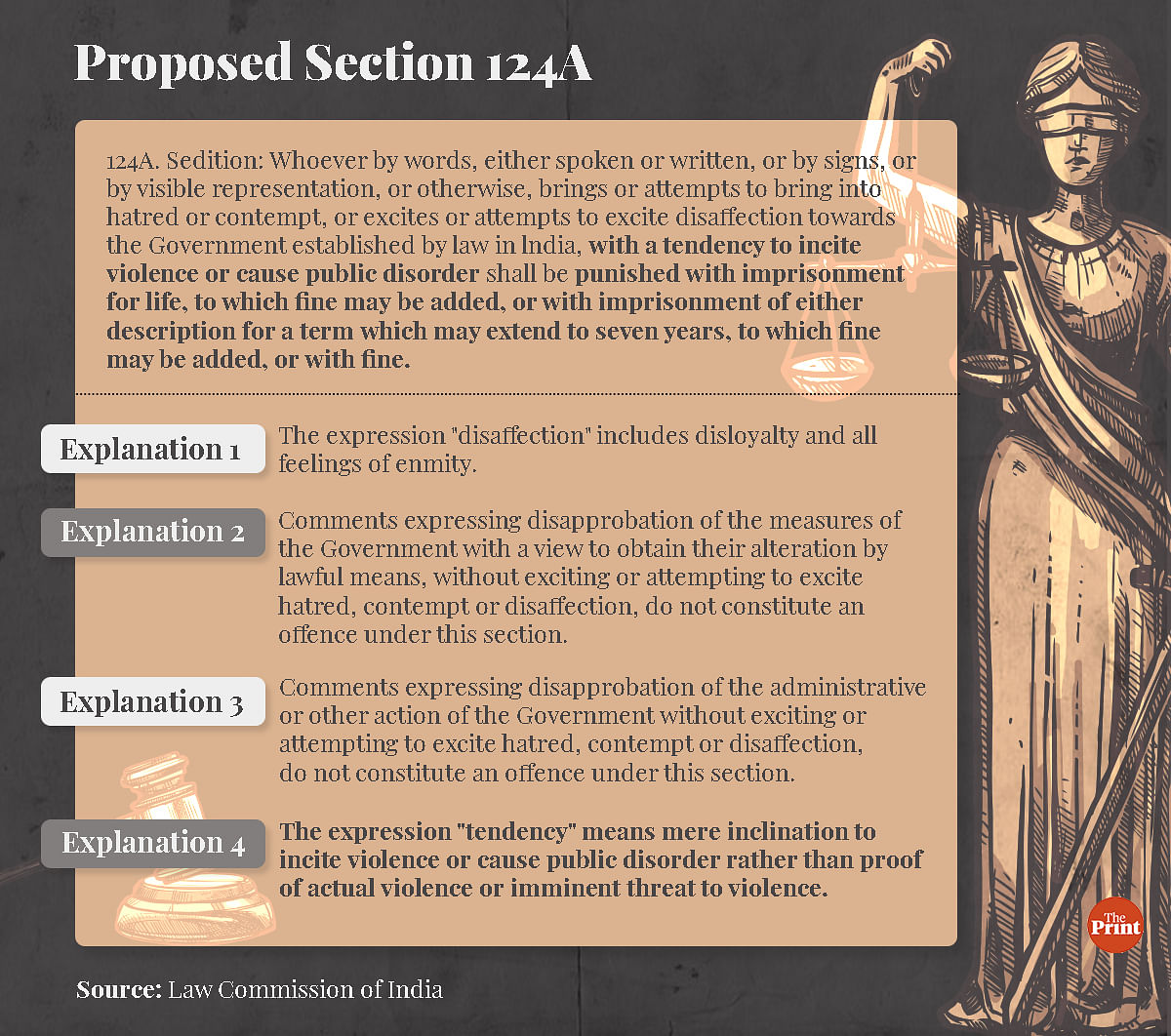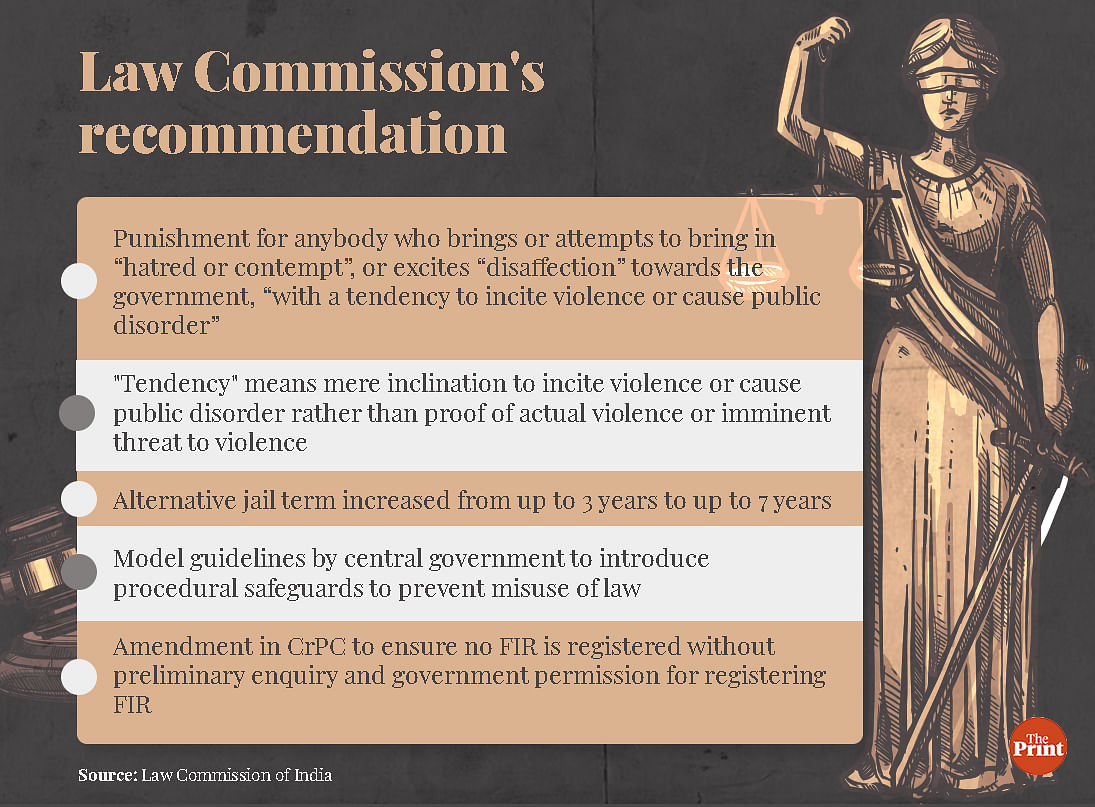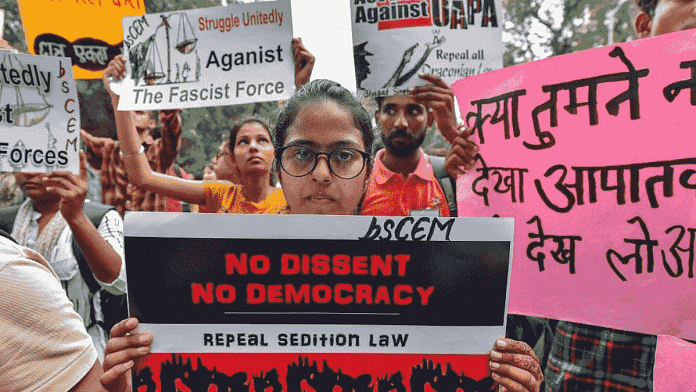New Delhi: The 22nd Law Commission of India has recommended that the law of sedition should be retained with certain changes — a development that comes a year after the Supreme Court put on hold all pending proceedings in such cases until the central government completes its re-examination of the provision.
In its 279-page report titled ‘Usage of the Law of Sedition’, submitted on 24 May to the Ministry of Law and Justice, the commission headed by Justice (retd) Ritu Raj Awasthi has argued that the law had its “utility in combating anti-national and secessionist elements”.
“Sedition being a colonial legacy is not a valid ground for its repeal”, the commission said in its report, arguing that “going by that virtue, the entire framework of the Indian legal system is a colonial legacy”.
In May last year, the Supreme Court put all pending trials, appeals and proceedings with respect to sedition charges in abeyance saying that it “hopes and expects states and Centre will refrain from registering any fresh FIR, continue with investigation or take any coercive measure by invoking section 124A of IPC, while the law is under consideration”.


In its report, the commission has recommended that the provision of sedition under Section 124A of the Indian Penal Code (IPC) should be retained but with the “removal of oddity” in the punishment prescribed under it.
Currently, the law provides for a life imprisonment or jail term of up to three years or a fine — a provision that the commission called a “glaring disparity” when compared to the punishment for other similar offences. The commission then goes on to recommend that the alternative jail term should be increased from up to three years to up to seven years.
It has also recommended a change in the phrasing of the provision. In its current form, Section 124A makes it a crime for anybody to bring or attempt to bring in “hatred or contempt”, or excite “disaffection” towards the government, whether it’s spoken or written words, or signs or visible representation.
The commission has now recommended that the provision should punish anybody who brings or attempts to bring in “hatred or contempt”, or excites “disaffection” towards the government, “with a tendency to incite violence or cause public disorder”.
It also adds that “tendency” would mean “mere inclination to incite violence or cause public disorder rather than proof of actual violence or imminent threat to violence.”
The report says that the commission had received a reference from the Ministry of Home Affairs in March 2016 for studying the usage of Section 124A of the IPC. The commission, the report said, has now conducted a “comprehensive study of the law relating to sedition and its usage in India, tracing its genesis and development”, along with its history in colonial and independent India, and the sedition law in various other countries.
Also Read: Nehru’s amendment to the Constitution was a revolution. Made sedition an invalid law
Procedural safeguards

In its report, the law commission refers to the Supreme Court’s observations in the landmark 1962 Kedar Nath Singh ruling. In that ruling, a five-judge Bench of the Supreme Court of India had declared that Section 124A — a colonial-era law on sedition — was valid but also attempted to balance it against free speech guaranteed in the Constitution.
The judgment had clarified that “dissent is not sedition”, with the court having limited the law’s scope only to “acts involving intention or tendency to create disorder, or disturbance of law and order, or incitement to violence”.
In the latest report, the law commission has said that while the test laid down by Kedar Nath Singh judgment is settled, “in the absence of any such express indication, a plain reading of Section 124A may seem to be vague and confusing, resulting in its misinterpretation and misapplication by the concerned authorities”.
It, therefore, recommended that the judgment should be incorporated in the phraseology of Section 124A “to bring about more clarity in the interpretation, understanding and usage of the provision.”
The report also suggests a recourse similar to that provided under Section 196(3) of the Code of Criminal Procedure (CrPC), 1973, to prevent the alleged misuse of the provision.
Section 196(3) of the CrPC talks about a preliminary investigation by the police before the central or state governments grant sanction for prosecution of certain offences. However, it says that in sedition cases, such a recourse should be taken before registration of a First Information Report (FIR) for sedition.
The report says that in order to do this, “procedural safeguards that can be laid down by the central government through issuance of model guidelines”. Alternatively, it proposes a proviso in Section 154 of the CrPC — which deals with information in cognizable cases — to say that no FIR will be registered for sedition unless a police officer, not below the rank of inspector, conducts a preliminary inquiry.
Such an inquiry should be conducted within seven days, according to the law commission, and its scope should be limited to ascertaining whether a prima facie case is made out and some cogent evidence exists. The officer should record his findings in writing, the commission says, adding that the central government or the state government should grant permission for such an FIR only on the basis of such an inquiry.
‘Reasonable restriction on free speech, combating secessionism’
Making a case to retain the law, the law commission rejected the contention that Section 124A violates Article 19(1)(a) of the Constitution — the provision that guarantees the freedom of speech and expression — saying that “sedition is a reasonable restriction under Article 19(2)” of the Constitution.
For context, Article 19(2) lists down eight grounds on which the right to freedom of speech and expression can be reasonably restricted — interests of sovereignty and integrity of India, the security of the State, friendly relations with foreign states, public order, decency or morality, contempt of court, defamation, and incitement to an offence.
Emphasising on the need to retain Section 124A, the report asserts: “Section 124A of IPC has its utility in combating anti-national and secessionist elements as it seeks to protect the elected government from attempts to overthrow it through violent and illegal means”.
“The ever proliferating role of social media in propagating radicalisation against India and bringing the Government into hatred, many a times at the initiation and facilitation by adversarial foreign powers, all the more requires such a provision to be present in the statute,” it adds.
However, the report also comments on the allegations of misuse of sedition law, saying that “while the political class may be accused of misusing the sedition law, the root of the problem lies in the complicity of the police”.
It blames the misuse on the erroneous interpretation of the law, as well as the fact that “sometimes, in an overzeal (sic) to please the political masters, the police action in this regard becomes partisan and not as per the law”.
It, however, says that allegations of its misuse by itself does not warrant a call for its repeal. It also lists down various threats to India’s internal security, including “Maoist extremism”, militancy and ethnic conflict in the Northeast, terrorism in Jammu & Kashmir, and movement for Khalistan.
(Edited by Uttara Ramaswamy)
Also Read: India has debated sedition at length but it won’t go without the overhaul of justice system



